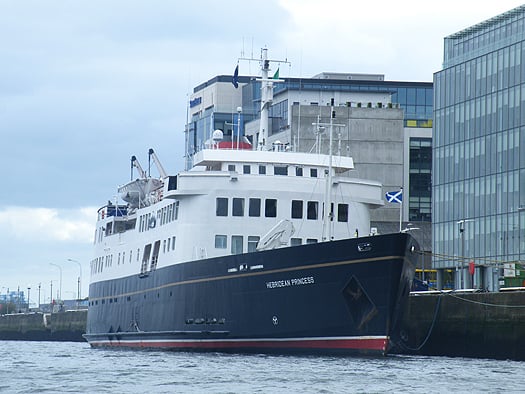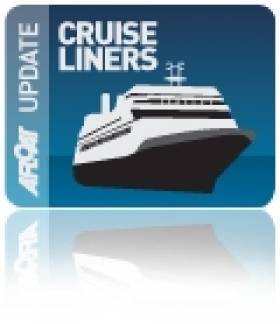Displaying items by tag: Royal Yacht
Queen Elizabeth's Chartered Cruiseship on Three-Day Visit to Dublin

Operated by Hebridean Island Cruises, the 5-star vessel which is for only 50 guests, has a reputation for exceptional service, fine dining and has a crew of 38. Accommodation is in thirty spacious, elegant and well-appointed cabins. On Princess Deck is located 'The Isle of Arran' (for deck plans click HERE) Suite which at 340sq ft is the largest and most expensive. The suite comprises a large separate dayroom, a spacious bedroom and a luxuriously equipped Victorian-style marble bathroom. In addition 10 cabins are designed especially for the single traveller. She has appeared in 1st place in UltraTravel Magazine's "10 Coolest Cruises"
Normally the Glasgow registered vessel operates throughout the Scottish highlands and islands, to lochs and remote mainland locations made accessible due to her small size. It is in these same waters that the Hebridean Princess has sailed in another guise as the humble car-ferry Columba (photos) for Caledonian MacBrayne. She was built in 1964 by Hall Russell, Aberdeen and served in this role until 1989 when she was sold and underwent an extensive conversion for the ultra-luxury cruise market.
Her three-day stay to Dublin is part of a Grand Celtic Cruise which started in Cardiff and which will include a call to Carlingford Lough tomorrow, followed by Strangford Lough, Bangor, Ballycastle, the Scottish isles of Jura and Crinan before disembarking in Oban, her home-port. The 10-night cruise inclusive of three-gala dinners cost €4,195 per person for a double cabin and €6,292 per person in a single-cabin.
A decade before Columba was launched, the Royal Yacht Britannia (5,682 tonnes) was commissioned in 1954. She was laid-down two years previously at John Brown & Co. Ltd, Clydebank and the year before she entered service she was launched by HM Queen Elizabeth II. For over four decades she served as the royal yacht until decommissioned in 1997. Her final foreign mission was to convey the last governor of Hong Kong and Prince of Wales from the former colony after its handover to China. She is now permanently moored as an exhibition ship in Edinburgh (Leith) for details click HERE.
Earlier this month Queen Elizabeth's namesake the 2010 built Cunard Line cruiseship Queen Elizabeth made her maiden Irish call to Dublin followed by Cork (Cobh). To read more on Dublin call click HERE and for Cork (Cobh) click HERE.
- Dublin Bay
- Dublin Port
- Dublin Docklands
- Cobh
- Cruise Liners
- Ports and Shipping
- Queen Elizabeth II
- Cruiseships
- Cunard Line
- The Convention Centre
- Cruise news
- Hebridean Princess
- Hebridean Princess Cruises
- Columba ferry
- Caledonian MacBrayne
- Hall Russell Shipyard
- Royal Yacht Britannia
- Hong Kong handover
- Prince of Wales
- Royal Yacht





























































